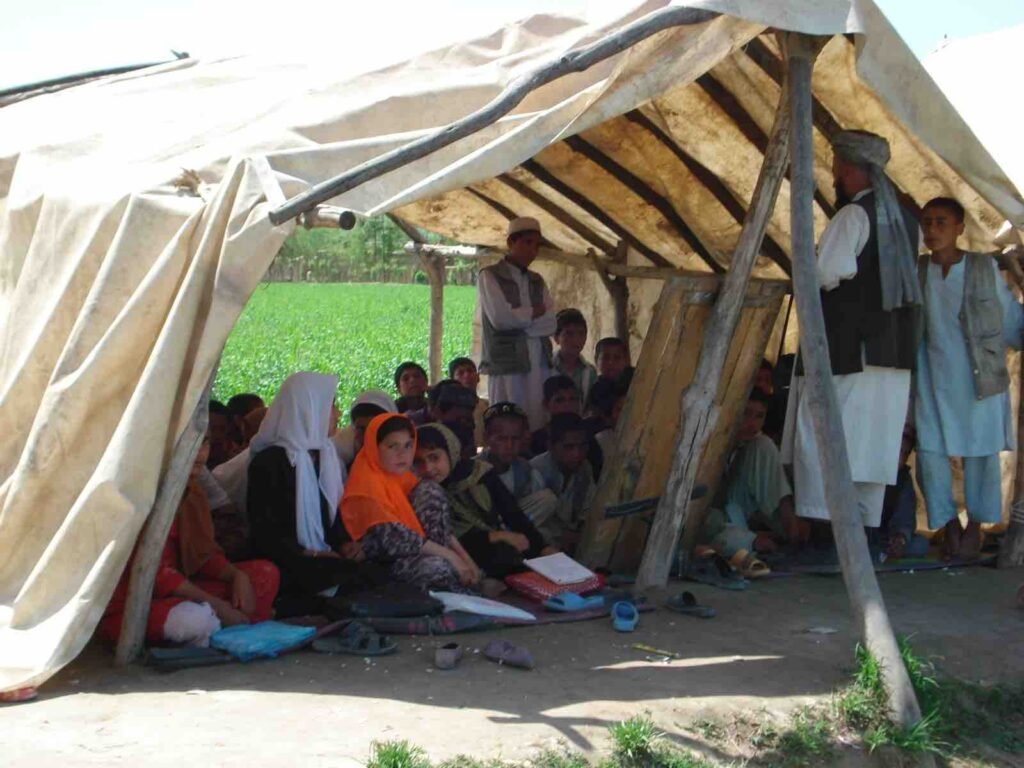Closed Doors, Dimmed Dreams: The Taliban’s Crackdown on Girls’ Education in Afghanistan

A school for elementary children in Omar Khel village, Yangi Qala district of Takhar province. Photo captured by @Ali Ahmad.
By Ilhamuddin Afghan
Since the Taliban takeover in 2021, Afghan girls above the sixth grade have been barred from formal education and the broken promise of reopening schools has left many, like Naseema, a former 11th grader from Kandahar, grappling with frustration and despair.
“The prolonged closure has inflicted mental torture,” Naseema laments. “We were initially hopeful, but now, in the third year, the schools remain closed. What justification can there be for this?”
For girls like Naseema, finding alternatives like remote-learning or TV programs offered a glimmer of hope, but a recent ban on girls’ participation in educational programs broadcasted on radio and television stations in Khost province further tightens the grip on female learning opportunities.
The Taliban’s rationale, as stated by the provincial police chief, deems such programs “inappropriate content.”
Talwasa, another student from Zarghona Anna School, speaks of the futility of demanding their rights.
“Expecting recompense from someone like the Taliban who inflicts harm, such as cutting off a person’s nose, is futile. The Taliban harbors animosity toward women,” she said.
Despite international pressure from organizations like the UN and the OIC, the Taliban maintains a vague stance. They offer promises of reconsideration in the future, yet their actions contradict these claims.
The Taliban officials downplay the ban’s significance, while actively suppressing girls’ educational opportunities.
“The claim of a potential reversal is simply an excuse,” argues Hamdullah, a former Ministry of Education official. “They have no genuine intention of allowing girls’ education. This will condemn a generation to illiteracy and regress the country by decades.”
Religious scholars and local leaders in Nangarhar have also urged the Taliban to reconsider. A retired university lecturer, speaking anonymously, criticized their stance as rooted in religious fanaticism. He emphasized the critical role of modern education in the 21st century, particularly in science and technology, and questioned the long-term consequences of the Taliban’s actions.
The international community’s reluctance to formally recognize the Taliban regime stems partly from concerns about their commitment to human rights, including girls’ education. The Taliban’s association with terrorism, lack of inclusivity in governance, and the absence of legislative initiatives further complicate matters.
The ban on girls’ education programs serves as a stark reminder of the challenges Afghan girls face in pursuing knowledge. Concerted efforts by the international community are crucial to pressure the Taliban to prioritize female education and uphold fundamental rights.
Until then, Afghan girls like Naseema and Talwasa will have their dreams locked away with their textbooks.
Ilhamuddin Afghan is a university professor based in Afghanistan.
Note: The contents of the article are of sole responsibility of the author. Afghan Diaspora Network will not be responsible for any inaccurate or incorrect statement in the articles.








